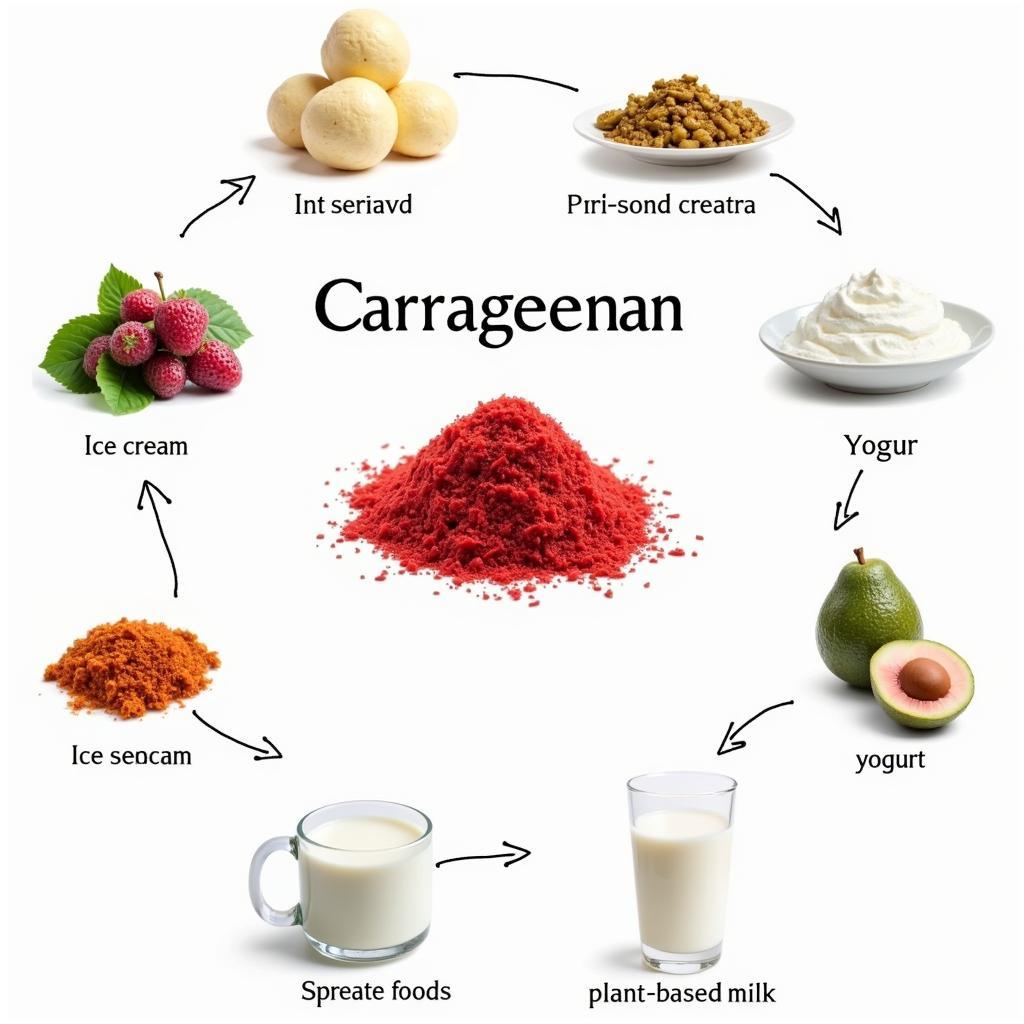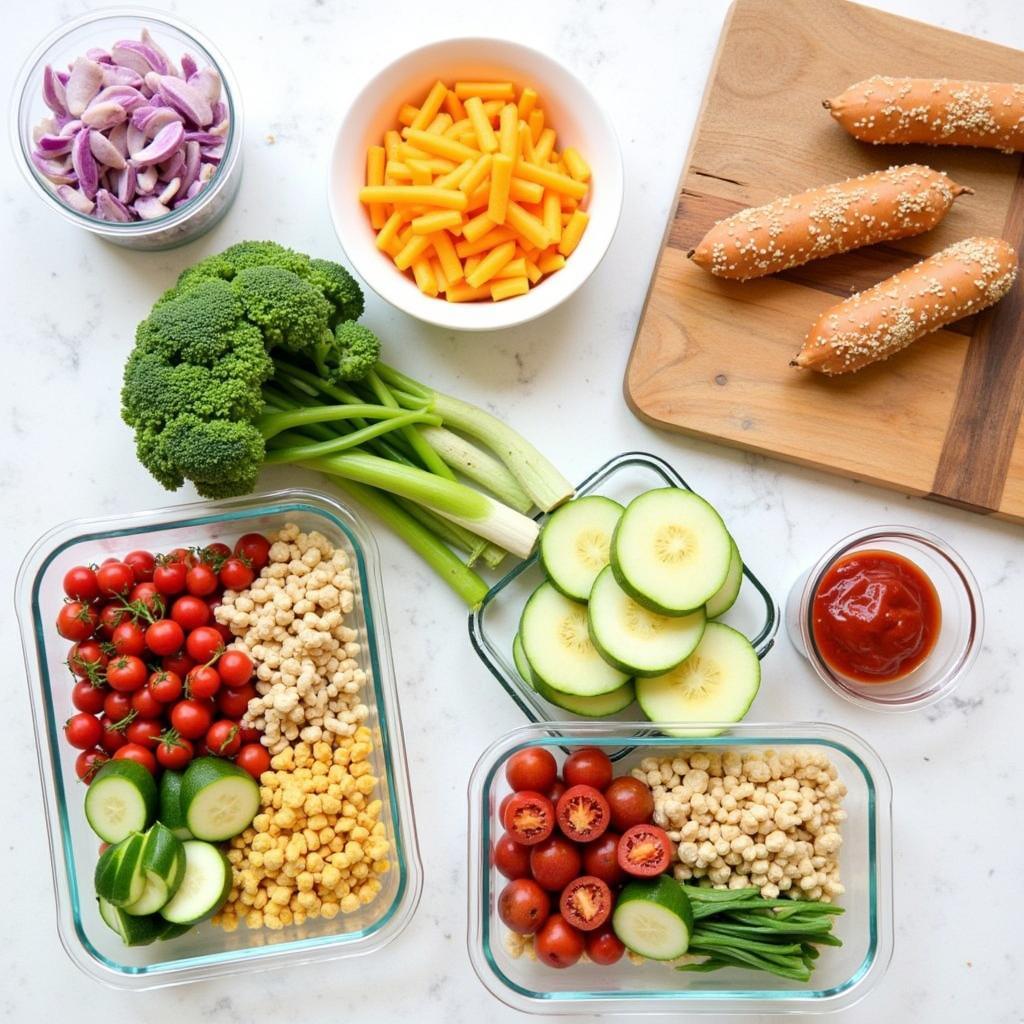Carrageenan-free food is becoming increasingly popular as more people become aware of its potential health implications. This guide will dive deep into understanding carrageenan, exploring its uses, potential side effects, and, most importantly, providing you with a comprehensive carrageenan-free food list to help you make informed choices. Let’s embark on this journey towards healthier eating!
Understanding Carrageenan: What Is It and Why Go Carrageenan-Free?
Carrageenan is a common food additive extracted from red seaweed. It’s used as a thickener, stabilizer, and gelling agent in various processed foods, from ice cream and yogurt to plant-based milk alternatives and even some deli meats. While generally recognized as safe by regulatory bodies, some studies suggest potential links between carrageenan consumption and digestive issues, inflammation, and even more serious health concerns. This has led many individuals to seek out carrageenan-free alternatives.
 Carrageenan Sources and Uses
Carrageenan Sources and Uses
Choosing a carrageenan-free lifestyle can be a proactive step towards better gut health and overall well-being. But how do you identify and avoid this common additive? That’s where our comprehensive carrageenan-free food list comes in handy!
Navigating the Grocery Aisle: A Comprehensive Carrageenan-Free Food List
Switching to a carrageenan-free diet may seem daunting, but it doesn’t have to be. With a little knowledge and planning, you can easily identify and avoid foods containing this additive. Here’s a detailed list to help you shop smarter:
- Dairy Alternatives: Many plant-based milk, yogurt, and creamers contain carrageenan. Opt for brands specifically labeled “carrageenan-free.” You might be surprised to learn that even some conventional dairy products contain this additive. Check labels carefully!
- Processed Meats: Deli meats, sausages, and even some pre-packaged poultry products can contain carrageenan. Look for brands that prioritize natural ingredients.
- Desserts: Ice cream, puddings, and other creamy treats often utilize carrageenan for its textural properties. Indulge in carrageenan-free options or explore homemade alternatives.
- Infant Formula: Surprisingly, some infant formulas include carrageenan. Opt for carrageenan-free formulas to ensure your baby’s delicate digestive system isn’t exposed to potential irritants.
- Canned Goods: Soups, sauces, and even some canned vegetables can contain carrageenan. Choose fresh or frozen options whenever possible, or thoroughly check labels. You can explore further information on carrageenan-free foods at carrageenan free foods.
What are some good carrageenan-free cat food options?
If you’re concerned about carrageenan in your pet’s diet, several high-quality carrageenan-free cat food options are available. For a balanced and nutritious option, you might consider Rachael Ray Nutrish canned cat food. Alternatively, Diamond Naturals wet cat food is another brand known for its commitment to natural ingredients. You can also research the use of agar agar in cat food as a carrageenan alternative.
Living Carrageenan-Free: Tips and Tricks
“Embracing a carrageenan-free lifestyle doesn’t mean sacrificing taste or convenience,” says Dr. Amelia Green, a registered dietitian specializing in gut health. “It simply requires a shift in awareness and a commitment to reading labels carefully.”
 Carrageenan-Free Meal Prep
Carrageenan-Free Meal Prep
Here are a few practical tips from Dr. Green:
- Become a Label Detective: Thoroughly review ingredient lists. Carrageenan is often hidden amongst other unfamiliar names.
- Embrace Whole Foods: Focus on incorporating more fresh fruits, vegetables, and whole grains into your diet. These naturally carrageenan-free options are packed with nutrients.
- Cook at Home More Often: Preparing meals at home gives you complete control over the ingredients, allowing you to confidently avoid carrageenan.
Conclusion: Embracing a Healthier You with Carrageenan-Free Choices
Switching to a carrageenan-free food list may seem like a small change, but it can have a significant impact on your overall health. By making informed choices and prioritizing whole, unprocessed foods, you’re taking proactive steps towards a healthier and happier you.
FAQ
- What is carrageenan made from? Carrageenan is derived from red seaweed.
- Why is carrageenan used in food? It acts as a thickener, stabilizer, and gelling agent.
- Is carrageenan always listed on food labels? Yes, it’s required by law to be listed in the ingredients.
- Are there any natural alternatives to carrageenan? Yes, ingredients like agar-agar and locust bean gum can serve similar purposes.
- Is carrageenan truly harmful? Research is ongoing, but some studies suggest links to digestive issues and inflammation.
- Where can I find carrageenan-free products? Many health food stores and online retailers specialize in carrageenan-free options.
- How can I learn more about carrageenan? Numerous online resources and scientific publications offer in-depth information.
For any further assistance, please contact us at Phone Number: 02437655121, Email: minacones@gmail.com Or visit us at: 3PGH+8R9, ĐT70A, thôn Trung, Bắc Từ Liêm, Hà Nội, Việt Nam. We have a 24/7 customer support team.